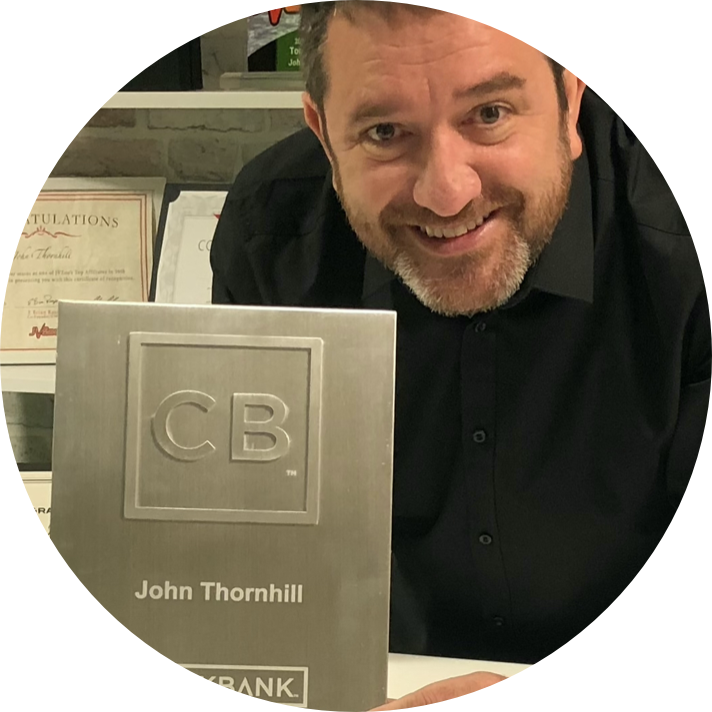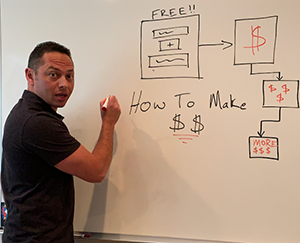The Future of Marketing Is More Human Than Ever written by Jarret Redding read more at Duct Tape Marketing
The Duct Tape Marketing Podcast with Carlos Gil In this episode of the Duct Tape Marketing Podcast, I interviewed Carlos Gil, global marketing leader, bestselling author of The End of Marketing, and Brand Evangelist at GetResponse. Carlos is known for his bold approach to digital marketing, particularly in how brands can rise above the noise […]
The Future of Marketing Is More Human Than Ever written by Jarret Redding read more at Duct Tape Marketing
The Duct Tape Marketing Podcast with Carlos Gil
In this episode of the Duct Tape Marketing Podcast, I interviewed Carlos Gil, global marketing leader, bestselling author of The End of Marketing, and Brand Evangelist at GetResponse. Carlos is known for his bold approach to digital marketing, particularly in how brands can rise above the noise in a world dominated by AI, social media, and content creation.
Carlos challenges the status quo with his core thesis: Marketing as we know it is dead. The future isn’t just about technology—it’s about reconnecting with people. As AI tools like ChatGPT reshape the landscape of content marketing and digital advertising, brands must refocus on what can’t be automated: human relationships. From employee advocacy to authentic storytelling, Carlos shares actionable strategies for creating a brand strategy that thrives in a tech-driven world while staying rooted in human connection.
Carlos Gil’s perspective is a timely reminder: in the race toward automation, don’t lose the human heart of your brand. The brands that will win in the future are the ones that embrace empathy, connection, and authentic communication—at scale.
Key Takeaways:
- Marketing is evolving—not ending. Brands must adapt by becoming more authentic, relational, and human-centric.
- AI in marketing is powerful, but limited. Tools like ChatGPT can support email marketing and content creation, but they can’t replace real brand relationships.
- Employee advocacy beats influencer marketing. Instead of outsourcing trust, Carlos encourages companies to empower employees to become true brand evangelists.
- Omni-channel marketing is essential. Businesses must diversify their presence across platforms while prioritizing ownership of their audience through email and direct communication.
- The most effective marketing strategy? Human connection. Creating real value through stories, vulnerability, and engagement helps brands rise above algorithm-driven sameness.
Chapters:
- [00:09] Introducing Carlos Gil
- [02:23] Brands Need to Humanize
- [07:46] AI and the Need for Human Relationships
- [12:25] Communicating the Human Element of Your Brand
- [15:49] Omni-channel Marketing
More About Carlos Gil:
- Connect with Carlos Gil on LinkedIn
- Read The End of Marketing: Humanizing Your Brand in the Age of Social Media by Carlos Gil
John Jantsch (00:01.09)
Hello and welcome to another episode of the Duct Tape Marketing Podcast. This is John Jantsch and my guest today is Carlos Gill. He's a global marketing leader and author. He's a US brand evangelist at GetResponse with over a decade of experience helping brands thrive in the digital age. He's also known for his bold results-driven strategies and insights on leveraging AI, social media, and email marketing to drive growth and engagement. Today we're going to talk about his latest book,
The end of marketing, humanizing your brand in the age of social media. So Carlos, welcome to the show.
Carlos Gil (00:36.991)
It's great to be here on the show, John. Thanks for having me.
John Jantsch (00:39.232)
So wait, marketing is over, it's not just evolving? Like it's the end? What do mean by the end?
Carlos Gil (00:45.635)
the end is just that look, you know, the first line, then the marketing, it's real provocative, the title itself is intended to be a provocative, engaging title to real people in and the first line of the book, not to spoil it for anyone, because I hope you go out and buy it, but it's marketing as we know it is dead, right? And like, that's the caveat that as we know it, and I say this, because I myself being millennial, right? I've been around now for multiple decades and generations, I've been able to see
John Jantsch (00:47.477)
You
John Jantsch (00:53.72)
Yeah, yeah.
John Jantsch (01:05.699)
Yeah, yeah, yeah.
Carlos Gil (01:14.079)
it's kind of shift throughout my lifetime from once not having digital technology to having digital to having the web to now everywhere we turn, we're seemingly connected and there's this just friction between brands and consumers. And, I know we're going to talk about the books. I don't want to give too much away early on, but the whole premise of the end of marketing is that brands want to be able to rise above all the digital noise that's existing today.
John Jantsch (01:15.918)
Mm-hmm.
Carlos Gil (01:42.377)
they need to become more human. And look, to be transparent with you, I wrote this book in 2019. It came out in 2019. The very end, this was before COVID. I then sat down and wrote the second edition during COVID in 2021, the second edition came out. And I have folks that reach out to me through social media, just about every single day, John. And they say like, wow, like, did you predict what was going to happen, especially with like the whole AI piece? Because I would say then the marketing speaks more so today.
John Jantsch (01:44.632)
Yes.
John Jantsch (01:48.302)
Hmm.
John Jantsch (02:05.752)
Yes.
Carlos Gil (02:10.335)
to a 2025 reader honestly than in 2019 when I wrote it.
John Jantsch (02:16.685)
You know, think though that that's actually, mean, I've been around a little longer than you, uh, Carla said, so I've been doing this, uh, a little longer. And so I've seen these ups and bounds and I mean, people have kind of used this idea of the end of marketing numerous times because anytime something really changes, they're like, Oh, the old way is dead. Um, so I, I, I, I 100 % agree. It's changing faster than ever. This idea of, you know, all AI is creating.
more sameness and more noise than ever before. So touch a little bit more on this idea. I've been really preaching lately that I think branding or brands are going to become more important than ever. You use the word humanizing brands. How does a business need to be looking at that today?
Carlos Gil (03:06.803)
Look, when I wrote Dundee marketing, one of my inspirations behind the whole thesis, which is that if brands want to survive this AI apocalypse that we are like right now in, right? Whether you want to accept it not. Yes, it's still the early days of AI, but what does that really mean? Like AI is evolving really fast. So early days of AI might mean that a year from now, like everything that you know about business is just completely flipped upside down on its head. So
John Jantsch (03:16.75)
Cheers.
Carlos Gil (03:35.453)
When I wrote this book, I started thinking about what's the competitive advantage from a marketing standpoint for any business or any brand. And that's relationships. And I know this having worked previously on the inside of brands, leading social media, having previously worked for LinkedIn, being a social network that you can't really scale or automate relationships. Right? So when you think about what AI is able to do, yes, AI can
write copy for you a lot of the AI that we refer to as more so language models, such as chat GBT. So yes, AI can write website copy and social media copy and it can operate a lot faster than human being great. I love it. But at the end of the day, is it as effective as a human behind the controls? I think that's that's TBD. What I can tell you that AI cannot do is automate relationships between humans. That's like a core theme of the
John Jantsch (04:32.162)
Mm-hmm.
Carlos Gil (04:33.427)
book. The core theme is just that like at the end of the day, whether you use technology to help you do your job or not, a relationship means means a lot, especially in this era that we're in where I fully believe by 2030, the value of a relationship. I'm not talking about social media follower, I'm talking about real relationship being able to, you know, hop on a webcast, do something like this with you, connect people, sit down, have human to human interaction, there's going to be an immense
John Jantsch (04:53.686)
Mm-hmm.
Carlos Gil (05:03.263)
premium on that experience. And for brands in order to stand out, you can't automate that. So how do you stay competitive when you're a multi billion dollar brand and you're looking to stay competitive within your own category? Well, it's simple, right? You've got influencers, right? That is one solution. But influencers, as I write in the marketing, they're really just a band aid. They're a temporary solution, right? You hire an influencer.
They promote your brand. see a little temporary bump in traffic to your website, right? It looks good. But when that influencer goes away, they take their following with them. So in order to sustain that success, you need to start making people the faces of your company. And ironically, the role that I'm doing now, what I've been doing with GetResponse for the last year, GetResponse being an email service provider that was created in the late 90s, is they brought me on board to serve in this brand evangelist role.
I really was that mean. So I wear multiple hats, right? Internally, I'm a marketing, you know, strategist, thought leader within the brand, but on the outside, I'm doing this, I'm on podcasts, I'm a company spokesperson, I'm speaking on behalf of the company at events. I just came back from South by Southwest, I was on the scene, creating video content. This what you're kind of seeing in action through myself is honestly, John, like the perfect bow to put on my own book.
John Jantsch (06:01.004)
Mm-hmm.
Carlos Gil (06:30.163)
that I wrote the end of marketing because I'm living it, I'm doing it, I'm showing other organizations out there. This is how you humanize your brand through people. It's not always hiring influencers, it's having a really strong and effective employee advocacy strategy, it's training your employees to really humanize your brand through their own content. And then it's also going out and finding individuals that can embody your brand and bringing them within whether it's hiring an influencer in house, right, to work for you for a year.
John Jantsch (06:46.52)
me
John Jantsch (06:58.541)
Mm-hmm.
Carlos Gil (06:59.475)
whether it's hiring someone like myself to go out and create content on your behalf, it puts a human face and voice on the company. And I tell you what, this, I believe, is the new wave going forward for brand marketers and the smart ones that figure out that balance of how to still sell, how to still market, but doing it in a way that feels authentic. You're doing it through a real human being. Those are the ones that are gonna stand out. Otherwise, I really believe you're gonna start seeing a lot of companies
Start scaling back on social, start even scaling back their digital presence because, you've got AI that now is able to operate faster, move more lean, create content for you. And that in itself creates a real challenge for brand marketers.
John Jantsch (07:45.452)
You know, I'm seeing actually there's, this whole kind of AI is going to replace people, you know, kind of a meme that that's out there very wide. And, and there's no question it's replacing functions. but I actually had someone on the show the other day that has created it's an AI tool. And they said that what it's actually doing is they're using AI to do a lot of, I don't know, let's call it grunt work, that, that people used to have to spend their time to do. And it's actually freeing their people up to
to do more relationships and to spend more time, you know, just meeting with people, over lunch, you know, or whatever it, you know, it might be. And I think that that's actually the way, the smart way that people are going to invest in their people is to not, to not look at this as like, we can, we can go down to two people now because we can have AI do all this. It's like, no, we can actually re align or refocus what our people actually do that is going to, you know, establish this brand, you know, as a different, know, standout brand.
Carlos Gil (08:36.575)
100%.
Carlos Gil (08:43.263)
Yeah, look, 100 % I have a love hate relationship with AI. use AI throughout my day. But what I will say is that it's very easy as a marketing professional to become reliant on AI to the point where it almost makes it hard for you to think for yourself. And that is free slope of all this technology, right? You become super reliant on it. And then chat GPT goes down. It's like, oh my god, like, I forgot how to I forgot how to write. Right? Like,
John Jantsch (08:59.471)
It's just
Carlos Gil (09:09.369)
It literally becomes like that. So what I always say is like, look, you need to find ways to make AI your trusted assistant. Historically, you have a marketing agency that you work with, you lean on them to write your social media ad copy, you lean on them to help you ideate like you have to build a relationship. You're using chat GPT, right? You have to build a relationship with your chat GPT. There's no other way around it. I have now spent a couple of years finessing and refining
John Jantsch (09:31.394)
Yeah, yeah. Yeah.
Carlos Gil (09:37.203)
But what I will say is the way that I use AI helps me actually be much more creative. Because I know now that I have a trusted companion within Chad GBT that if I'm, for example, in an airport and an idea comes to my mind, I can speak into my phone and I can get real time feedback. Right? I can help, you know, ideate with the help of AI without having to call someone, without having to pay an agency. Right? So like there's that aspect of it that I believe has it's good.
John Jantsch (09:46.232)
Mm-hmm.
John Jantsch (09:55.736)
Yeah. Yeah.
Carlos Gil (10:06.815)
But then there's the other aspect of it that if you rely so much on AI to do all the heavy lifting, all the grunt work as you call it, or the menial tasks, now you are removing the human element out of things like copywriting or even writing an email or a text message. Like it's crazy. I see people all the time now. I'm on airplanes a lot and they're writing a text message and they go over to ChatGBT.
to almost like copy, edit the text and then they go back. It's like, my goodness, like this is going to continue to create this friction as I like to call it between humans and technology. And it goes.
John Jantsch (10:37.038)
Yeah.
John Jantsch (10:45.566)
Imagine when we have an entire generation that that's all they know.
Carlos Gil (10:49.821)
Well, like imagine what's really scary is imagine you and I not even have to record a podcast because there's so much content of you and there's so much content in me over the years. The AI knows my face and my voice and it could just recreate this conversation. Like it exists right now. There's AI conversational platforms that you can record 15 seconds of your voice and it will just record a podcast for you. It's insane what it can do. And that's great. We're going to continue to see that.
John Jantsch (11:04.94)
Yeah, people are doing it. Yeah.
Carlos Gil (11:16.127)
I firmly believe that we're entering an era where there'll be bestselling books written by AI, top podcasts on Spotify that are created by AI. There's gonna be new billionaires are created. There will be new billionaires created because of AI, because of systems. My whole point here though is don't lose sight of human to human relationships. Like that will always outweigh
John Jantsch (11:22.822)
totally.
Carlos Gil (11:43.487)
what technology can do. And the reason for that is because, you know, this is like just old school business, right? It's like, I'm going to speak right now that the Gen Zers out there, they're listening or watching, like business has always been predicated based on who you like, trust and relate to. So if you like someone, you have a higher likelihood to do business with them. If you trust them, if you relate to them, you want to do business with people that you like, trust and relate to. And I'm sorry, in an AI driven world, where it's really noisy,
John Jantsch (11:48.866)
Yes.
Carlos Gil (12:10.367)
Yes, it becomes challenging to sift through that noise. But inevitably, if you're able to connect with people, IRL, or you're able to connect with people online and kind of weed out the AI element of that relationship, like, yeah, man, it's just old school business 101.
John Jantsch (12:28.238)
You know, a lot of times people, think everybody gets that, you know, that idea of be more human, be more human. But this sounds really silly, but I have a lot of people who are like, well, how do you do that? You know, how do you, how do you communicate that? And I, and I think the, the real thing that AI doesn't do is it can't make up a story that only I know, never will. Um, you know, right. So storytelling, uh, vulnerability, uh, I don't see too much AI kind of saying, look, I made this mistake and here's what I learned from it.
Carlos Gil (12:46.099)
Right?
John Jantsch (12:54.827)
So, I mean, think some of those elements need to be in our marketing to kind of show or communicate the humaneness, don't they?
Carlos Gil (13:02.139)
Absolutely. And look, like the other element of this that I want to reel and it's something I'm very passionate about right now is this whole notion of owning your data, right? Like AI aside, AI is great from operational standpoint, but we are living right now in this just noisy digital ecosystem. And I write about this in the book. I talk about this one when I'm on stage. I take it you've seen the movie Cast Away, John? Right. It's one of my favorite movies of all time. And anyone that follows my work, whether you read it or you read my podcast,
John Jantsch (13:10.712)
Yeah.
John Jantsch (13:25.198)
yeah, sure, sure.
Carlos Gil (13:31.795)
like this, or you see me speak on stage, I always make analogies. I'm like, what kind of has helped me as a marketer define my voice in this whole space is I'm not a textbook marketer. one these guys that I've been in the trenches, I've done the work, I've worked in corporate, I've started businesses, and I learned and I go out and teach. And I use a lot of analogies. So my point of where I'm going with this is that in the movie Castaway, Tom Hanks is stranded on this island. And throughout the movie, he's talking to a volleyball named Wilson.
And I often use this comparison that we as digital marketers are the equivalent of Tom Hanks speaking to a volleyball, right? We produce all this content. We spend all this time in the lab making videos, making shorts, making reels, writing blogs. And if no one consumes them, right? No one's listening. Then that is the equivalent of Tom Hanks speaking to Wilson. So you have all this noise that's taking place every single day. And it's not just brands competing against other brands. Like way back in the day, I used to run social media for a brand named Winn-Dixie.
there's supermarket chain here in Florida. And the primary competitors was Publix and Walmart, and Albertsons and a couple other stores. Well, nowadays, if you're a supermarket chain, just using this example, you're not competing against supermarkets, so we're talking about food, you're competing against bloggers or vloggers, you're competing against influencers, cooks, you're competing against anyone that's in your category, that's taking market share away from your brand, which is why I go back to the basis of
relationships be important. And one of my passionate topics right now in this era that we're in is this notion that you need to own your data. You cannot rely on these social networks to give you reach. You cannot rely on the little breadcrumbs that Metta or Instagram give you. You just can't. We recently saw TikTok go through a very scary situation where they were temporarily banned. And that I believe should be a wake up call to every single business, every single creator, influencer, anyone.
John Jantsch (15:15.15)
you
Carlos Gil (15:25.545)
who's relying on these technologies to grow and promote their business, you cannot rely on them. You need to use them for reach. You need to use them to create awareness for your business. But inevitably, you need to be taking those relationships, i.e. those followers, you to move them over into systems and platforms like email. You need to own data and you cannot be reliant because unfortunately, when you do become reliant on these systems, you are just putting too much control in their hands.
John Jantsch (15:53.71)
Yeah, you know, it used to be, mean, when, I don't know, let's say 2005, 2006 or so when social media started, you know, popping on the scene, it was very much seen as a top of the funnel. Like here's how to get reach. Here's how to get exposure. Here's how to get seen. But you got to drive people back, you know, to the property of your own. Mainly, we tried to drive people back to our websites, right? We'd post our blog and say, here, come read my blog here. Well, now a lot of those platforms.
Don't ever want you to leave. And so, you you get penalized for doing any of that kind of drive people back. And another thing I'm seeing happen is, you know, on TikTok, you're seeing entire journey or entire, you know, funnel happening on TikTok. It's no longer just top of the funnel. People are actually transacting. So, so how, how do people kind of balance that idea that I now need to be more places with like a full, you know, full range of content as well as, you know,
I 100 % agree, own your own data.
Carlos Gil (16:56.157)
You know, I've been saying this, John, since probably about 2015 when I started speaking. I go back and I look at some of my earlier content. I'm like, man, I've been saying the same thing for a decade now. And one of the key terms I have said to folks, and this goes back to when I worked in corporate marketing running socials, have an omnichannel presence. Don't be married to one platform. Use these platforms the way that they use you.
And I'll just tell you as someone that has spent a lot of time in these platforms as a user, and again, having worked for a major social network, these social networks at the end of the day, they all do the same thing. They're all digital advertising platforms. And I think this is something that's lost upon the majority of creators because again, like let's think of it, your average business owner, your average influencers using platforms, they're just trying to get rich. They're trying to continue to build a community, get followers. The name of the game should not be to get followers.
Your objective as a business needs to be to generate more revenue, right? Followers, it's a vanity metric, right? Like, you know that you've worked in the industry for a very long time as well. So I always am constantly preaching this. Use these platforms the same way they use you. The way they use you is they're using you because you're creating contents, keeping people on the platforms. And as long as you're keeping people on the platforms, they're selling more ads and they're making more money, right? Like they are in the business of making money. That's what these social networks do. And again,
John Jantsch (17:52.878)
Yes.
John Jantsch (18:20.184)
Yeah. Well, and let's throw Google in under the bus too. mean, that's what Google's, you know, existence is as well.
Carlos Gil (18:25.193)
Yeah, it doesn't make them bad. Like by any means, like if anyone from Google or LinkedIn or better, any of these platforms are listening or watching, like this doesn't make them bad. It's just understanding the game. Like these are businesses. So if I am running a business, right, I always use this analogy again, going back to the analogy, if I, for example, am running, let's just say a flea market, right? We all know what a flea market is. You cannot walk into my flea market and set up a table and sell without paying a hundred bucks to the owner of the flea market.
John Jantsch (18:35.554)
Right. Yep.
John Jantsch (18:49.762)
Right.
Yeah, right,
Carlos Gil (18:53.929)
to rent for a day. If you're a barber, you can't go to a barber shop and cut hair and not expect to give the owner his or her cut. That's just business. Social media networks operate the same exact way. And again, it doesn't make them bad. You just have to understand the rules of the game. And normally when I do my talks, have like, sorry, I have this slide behind me and it has like a casino and like Zuckerberg's face in front of it. And I always say like,
look at meta, for example, and like they are a form of casino, because they'll give you a little dopamine, they'll let you win here and there in the form of a viral video or your post might reach, you know, more than 1 % of your following audience. But they're not gonna let you win all the time. And they're not gonna let you do it for free. And you have to pay to play inevitably. And again, man, like I love this space. Like, I know we've talked about AI, and we're trying to get as much in and in the time that we're together. I love I just love the space, man.
John Jantsch (19:24.654)
Yeah.
Carlos Gil (19:50.911)
I've worked in social media professionally since oh wait, I got onto social media in 1995, back then when I was 12 and it was known as AOL. I have grown up evolving with this in my life. I've made a lot of money as an entrepreneur using it. I've made a lot of money as a creator using it. I've helped businesses make a lot of money using these tools. Like I love them. They're great. However,
where I do keep it 100 as a thought leader and speaker in the space is what I've already said. And I'll repeat it one more time. If it's cool, you cannot rely on these networks alone. You have to have an omni-channel strategy. And that means go wide, have a presence on multiple platforms, build a community within those platforms. Don't just rinse and repeat your content because now you're not giving people an incentive to go follow you in different channels. And most importantly, you need to find ways to own your data, which is pretty simple. Start up a newsletter, right?
John Jantsch (20:33.038)
you
Carlos Gil (20:45.671)
to get response, sign up, get a newsletter. And then as you're creating content that people enjoy seeing, remind them, hey, if you want to see more of this, if you want to be a part of my insider circle, my club, my mastermind, however you frame it, now you have a solution to give people that you own. So you don't have to rely on the out.
John Jantsch (21:02.435)
Yes.
Yeah. I, know, just another practical nod to that idea is that a lot of times people have to bump into you in about five places before they start paying attention. you know, so it's, it's the old, gotta hear, you know, I gotta hear your message or see your sign or whatever it is multiple times before I'm really going to, to start tuning in. Well, Carlos, I appreciate you taking a moment to stop by the duct tape marketing podcast. Where would you invite people to find, to connect with you first off, but then find out more about the end of marketing.
Carlos Gil (21:34.303)
Yeah, for sure. So once again, John, thank you so much for having me on your podcast today. It has been a pleasure. You can learn about the end of marketing by going to Amazon. Just look up end of marketing. There's the first and second edition. Also, I want to call out, get response, shout out, get response, go to get response.com. You can sign up for a free trial there. If you have any questions with regards to setting up a newsletter, email marketing, please be sure to reach out to me. You can connect with me on all the socials, Carlos skill 83 and LinkedIn.
is my go to platform of choice if you want you can connect on me there but I love Instagram I love tiktok love Facebook I am a proponent of look let's get to know each other LinkedIn is great but you only get to know so much about me and me of you on LinkedIn it's professional social network and at the end of the day so if you're on Instagram look me up at Carlos guilty 3 let me know that you heard this episode of the duct tape podcast and any way that can help you out let me know I'm here I got you
John Jantsch (22:32.878)
Awesome. I appreciate it, Carlos, and hopefully we'll run into you one of these days out there on the road.
Carlos Gil (22:37.599)
All right, John, I appreciate you.
Sign up to receive email updates
Enter your name and email address below and I'll send you periodic updates about the podcast.
Recommended Story For You :

How To Make $3493 Commissions Without Doing Any Selling

Successful dropshippers have reliable suppliers.

People Think I Use A Professional Voiceover Artist. NO! I Just Use Speechelo!

Make Money Testing Apps On Your Phone Or Tablet

Make More Money or Lose Everything

Sqribble Is The ONLY eBook Creator You’ll Ever Need.

Work & Earn as an Online Assistant

Create Ongoing Income Streams Of $500 To $1000 Or More Per Day

It's The Internet's Easiest Side Business.

